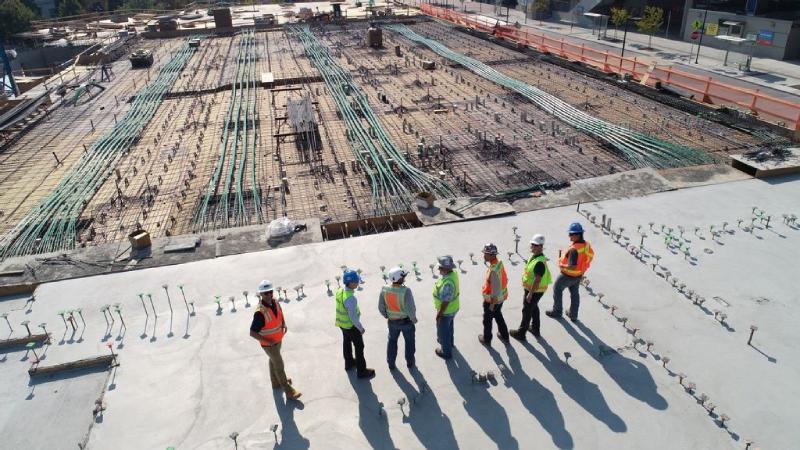Buildots Ltd., an artificial intelligence startup that makes digital twins of building sites via computer vision, announced today that a $15 million investment lead by Intel Capital had completed.
The business raised a total of $121 million in this round, with participation from OG Tech Partners and other prior investors.
Buildots claims that it can assist engineers in gathering on-site data to monitor the progress of building projects, locate and resolve bottlenecks, and generally expedite the construction workflow by generating a digital duplicate of a construction site.
The Buildots platform can analyze the effectiveness of specific building jobs and offer recommendations that can lower costs and enhance performance, with up to 50% reduction in delays. Instead than relying on the subjective self-reporting that the construction industry has always used, its platform makes use of objective site data. By measuring the exact state of every activity on a construction site, this enables Buildots to give more precise progress reports and dependable performance indicators that site managers can rely on to reduce risks and delays before they become more significant issues.
According to the startup, construction companies may greatly benefit from AI innovation in order to overcome numerous obstacles and inefficiencies associated with building projects. It emphasizes that even small mistakes can cause major delays and budgetary disparities because of the complexity, expenses, productivity issues, and several stakeholders involved in every particular project. Buildots thinks it can address a lot of these problems and lower building project costs and increase overall efficiency with their digital twin technology.
Over the past few years, Intel Capital, like the venture capital divisions of most large tech companies, has invested millions of dollars into numerous AI businesses. However, the choice to invest in Buildots is noteworthy because its parent firm, Intel Corp., is a construction giant in addition to being one of the largest chipmakers in the world. It is presently working on several multibillion dollar development projects across the globe in an effort to increase its capacity for producing chips so that it may more effectively compete with Asian producers such as Taiwan Semiconductor Manufacturing Co.
Fab 52 and Fab 62, Intel’s two chip fabrication units in Ocotillo, Arizona, are among the company’s major projects. Currently scheduled for completion in 2025, they will cost over $20 billion. Furthermore, Intel just began construction on two additional chip fabrication facilities in Ohio, with a potential investment of up to $28 billion. Additionally, it is constructing additional facilities in Israel, Germany, France, Ireland, and Italy.
All of these projects are necessary for Intel to fulfill its earlier this year stated aspirations to become a contract chip manufacturer for other chipmakers through its Intel Foundry company.
It is estimated that Intel has more than $100 billion set aside for building projects in the United States alone, including both new facilities and renovations. However, the business is struggling; in fact, Intel Foundry’s most recent earnings call revealed huge losses. Intel has looked to private equity firms like Apollo Global Management Inc., which recently acquired a 49% share in the company’s Fab 34 chip facility in Ireland, for support in covering those costs.
Although Intel has received billions of dollars in subsidies from the US and other governments, this investment implies that the company is also looking to save costs by increasing the efficiency of its building operations.
Buildots’ technology might assist Intel in achieving that. The business has unveiled a new tool called “delay forecast,” which employs artificial intelligence (AI) to forecast potential construction delays and allow managers to mitigate their potential effects by taking proactive measures. Buildots reports that certain construction companies have already experienced up to a 50% reduction in wait times because to this new function, which has resulted in significant cost savings.
Though the business has previously stated that it is working with the chip giant, Intel has not officially acknowledged that it is utilizing Buildots’ software in its own building projects.
Roy Danon, the CEO and co-founder of Buildots, stated today that Intel Capital has acknowledged how little the construction sector has profited from the digital era thus far. Thus, Buildots sees great opportunity to lead “a transformative shift towards performance-driven construction management,” according to Danon, and hopes to revolutionize a multitrillion dollar global industry.
Because major building projects are complex and unique, as well as because the construction industry frequently involves multiple stakeholders, including suppliers, architects, engineers, and contractors, software and technology have had difficulty breaking into the market.
But with the development of AI technology, that seems to be changing. Startups like Voyage Control Ltd., which provides AI-powered project management and logistics software for the construction industry, and Dusty Robotics Inc., which offers AI tools for tracing building blueprints on construction sites—a task that has historically always been done by hand—join Buildots in the construction tech sector.
Lisa Cohen, the investment director of Intel Capital, who will join Buildot’s board of directors, stated that Intel has the ability to recognize the potential influence of artificial intelligence in the construction business because of its experience working on some of the biggest and most intricate construction projects globally.
Cohen stated, “A more productive future for the global construction market will be enabled by Buildots’ visionary outlook and ability to apply AI-powered predictive analytics to increase construction efficiencies.”


